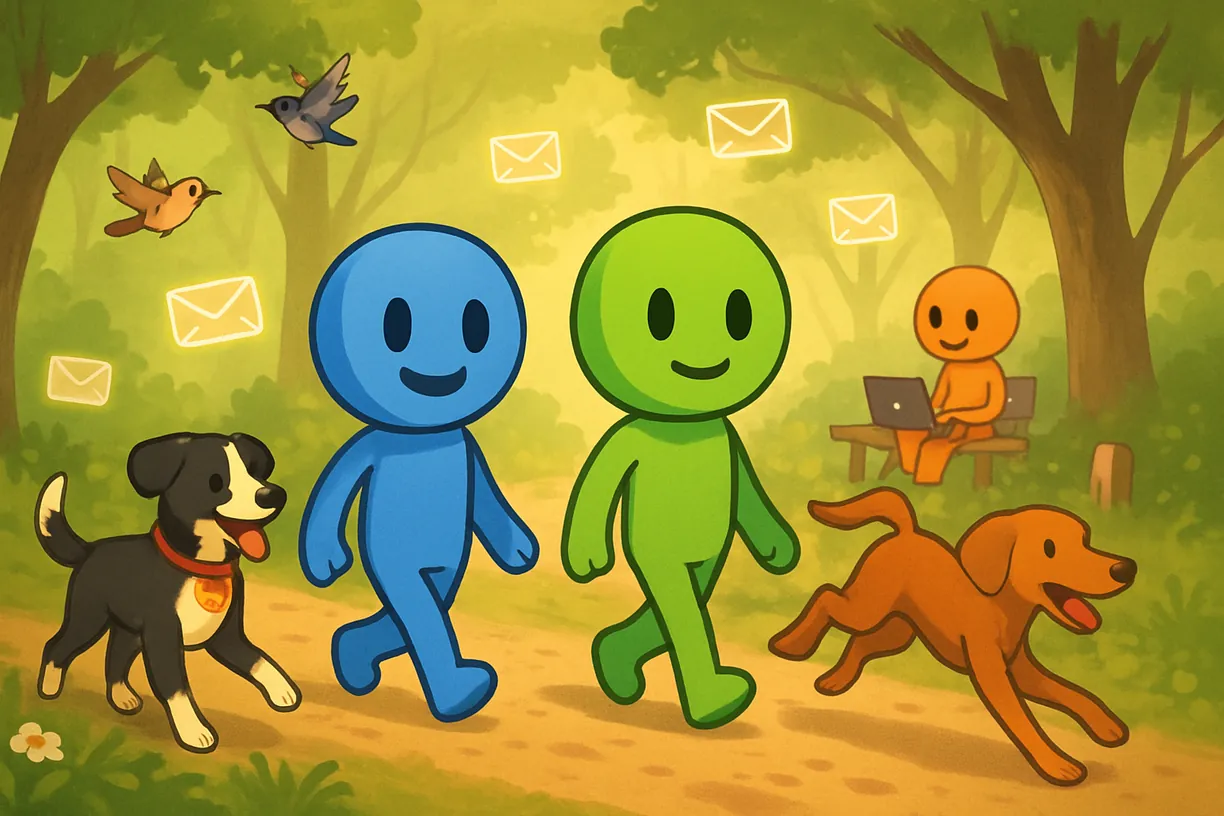
O přeposílaném e-mailu
Přehled
Tip
Technické podrobnosti o naší architektuře, implementacích zabezpečení a plánu naleznete v dokumentu Technická bílá kniha.
Přeposílání e-mailů je služba zdarma a s otevřeným zdrojovým kódem přeposílání e-mailů zaměřená na uživatele právo na soukromí. To, co začalo jako jednoduché řešení pro přeposílání e-mailů v roce 2017, se vyvinulo v komplexní e-mailovou platformu nabízející neomezený počet vlastních domén, neomezený počet e-mailových adres a aliasů, neomezený počet jednorázových e-mailových adres, ochranu proti spamu a phishingu, šifrované úložiště poštovní schránky a řadu pokročilých funkcí.
Službu spravuje a vlastní její původní zakládající tým designérů a vývojářů. Je postavena na 100% open-source softwaru s využitím JavaScript, Node.js, DNS, HTTPS, TLS a SMTP.
Zakladatel a poslání
Společnost Forward Email založil Nicholas Baugh v roce 2017. Podle uživatele Technická bílá kniha pro přeposílání e-mailů Baugh zpočátku hledal cenově dostupné a jednoduché řešení pro povolení e-mailu na doménových jménech pro své vedlejší projekty. Po prozkoumání dostupných možností začal programovat vlastní řešení a 2. října 2017 zakoupil doménu forwardemail.net.
Poslání společnosti Forward Email přesahuje rámec poskytování e-mailových služeb – jejím cílem je transformovat přístup odvětví k ochraně soukromí a zabezpečení e-mailů. Mezi klíčové hodnoty společnosti patří transparentnost, kontrola uživatelů a ochrana soukromí prostřednictvím technické implementace, nikoli pouze prostřednictvím politických slibů.
Časová osa
2017 - Založení a spuštění
2. října 2017: Nicholas Baugh zakoupil doménu forwardemail.net poté, co prozkoumal cenově výhodná e-mailová řešení pro své vedlejší projekty.
5. listopadu 2017: Baugh vytvořil 634řádkový JavaScriptový soubor s použitím Node.js pro přeposílání e-mailů pro libovolný vlastní název domény. Tato počáteční implementace byla publikována jako open-source pro GitHub a služba byla spuštěna pomocí GitHub Pages.
Listopad 2017: Po prvním vydání bylo oficiálně spuštěno přeposílání e-mailů. První verze byla založena čistě na DNS bez registrace účtu nebo registrace – pouze soubor README napsaný v Markdownu s pokyny. Uživatelé si mohli nastavit přeposílání e-mailů konfigurací záznamů MX tak, aby odkazovaly na mx1.forwardemail.net a mx2.forwardemail.net, a přidáním záznamu TXT s forward-email=user@gmail.com.
Jednoduchost a efektivita tohoto řešení přilákala pozornost významných vývojářů, včetně David Heinemeier Hansson (tvůrce Ruby on Rails), který dodnes používá Forward Email na své doméně dhh.dk.
2018 - Infrastruktura a integrace
Duben 2018: Když společnost Cloudflare spustila protokol Služba DNS pro spotřebitele s prioritou soukromí, služba Forward Email přešla z protokolu OpenDNS na protokol Cloudflare pro zpracování vyhledávání DNS, což demonstruje závazek společnosti k volbám infrastruktury zaměřeným na soukromí.
Říjen 2018: Funkce Přeposílání e-mailů umožnila uživatelům „Odesílat poštu jako“ s parametry Gmail a Výhled, čímž se rozšířily možnosti integrace s oblíbenými poskytovateli e-mailu.
2019 - Revoluce ve výkonu
Květen 2019: Vydána verze 2 pro Forward Email, která představovala zásadní přepracování původních verzí. Tato aktualizace se zaměřila na vylepšení výkon pomocí proudy z Node.js, čímž položil základy pro škálovatelnost platformy.
2020 – Zaměření na soukromí a bezpečnost
Únor 2020: Společnost Forward Email vydala plán Enhanced Privacy Protection, který uživatelům umožňuje vypnout nastavování záznamů veřejného DNS s aliasy konfigurace pro přesměrování e-mailů. Díky tomuto plánu jsou informace o aliasech e-mailů uživatele skryty před veřejným vyhledáváním na internetu. Společnost také vydala funkci, která umožňuje povolit nebo zakázat konkrétní aliasy a zároveň jim umožňuje zobrazovat se jako platné e-mailové adresy a vracet úspěšnou hodnotu Stavové kódy SMTP, přičemž e-maily jsou okamžitě zahozeny (podobně jako při přesměrování výstupu na /dev/null).
Duben 2020: Poté, co společnost narazila na nespočet překážek u stávajících řešení pro detekci spamu, která nerespektovala zásady ochrany osobních údajů společnosti Forward Email, vydala svou první alfa verzi Spam Scanneru. Toto zcela bezplatné a open-source řešení filtrování spamu používá přístup Naivní Bayesův spamový filtr v kombinaci s ochranou anti-phishing a Útok na homograf IDN. Společnost Forward Email také vydala dvoufaktorové ověřování (2FA) s využitím jednorázová hesla (OTP) pro zvýšení zabezpečení účtu.
Květen 2020: Funkce Forward Email povolila uživateli vlastní přesměrování portů jako alternativní řešení pro obejití blokování portů pomocí ISP. Společnost také vydala Bezplatné RESTful API pro přeposílání e-mailů s kompletní dokumentací a příklady požadavků a odpovědí v reálném čase, spolu s podporou webhooků.
Srpen 2020: Funkce Forward Email přidala podporu pro systém ověřování e-mailů Ověřený přijatý řetězec („ARC“), čímž se dále posílilo zabezpečení a doručitelnost e-mailů.
23. listopadu 2020: Služba Forward Email byla veřejně spuštěna po ukončení beta testování, což představuje významný milník ve vývoji platformy.
2021 - Modernizace platformy
Únor 2021: Společnost Forward Email provedla refaktoring své kódové základny, aby odstranila všechny závislosti [Krajta](https://en.wikipedia.org/wiki/Python_\(programming_language\) ("Python (programovací jazyk)"), což umožnilo, aby se jejich stack stal 100% JavaScript a Node.js. Toto architektonické rozhodnutí bylo v souladu se závazkem společnosti udržovat konzistentní technologický stack s otevřeným zdrojovým kódem.
27. září 2021: Přeposílání e-mailu přidaná podpora pro aliasy pro přeposílání e-mailů, které odpovídají regulární výrazy, což uživatelům poskytuje sofistikovanější možnosti směrování e-mailů.
2023 – Rozšíření infrastruktury a funkcí
Leden 2023: Společnost Forward Email spustila přepracovaný web optimalizovaný pro rychlost načítání stránek, čímž zlepšila uživatelský zážitek a výkon.
Únor 2023: Společnost přidala podporu pro protokoly chyb a implementovala barevné schéma webových stránek tmavý režim, které reaguje na preference uživatelů a potřeby přístupnosti.
Březen 2023: Společnost Forward Email vydala Mandarinka a integrovala ho do celé své infrastruktury, což umožnilo použití DNS přes HTTPS („DoH“) na aplikační vrstvě. Společnost také přidala podporu pro MTA-STS a přešla z hCaptcha na Turniket Cloudflare.
Duben 2023: Implementace a automatizace zcela nové infrastruktury pro přeposílání e-mailů. Celá služba začala běžet na globálně vyvažovaném DNS s DNS založeným na blízkosti, s kontrolami stavu a failoverem pomocí Cloudflare, čímž nahradil předchozí přístup DNS typu round robin. Společnost přešla na bare metal servery u více poskytovatelů, včetně Vultr a Digitální oceán, kteří jsou oba kompatibilní s SOC 2 Type 1. Databáze MongoDB a Redis byly přesunuty do clusterovaných konfigurací s primárními a záložními uzly pro zajištění vysoké dostupnosti, end-to-end SSL šifrování, šifrování v klidu a obnovení v daném bodě (PITR).
Květen 2023: Společnost Forward Email spustila funkci odchozí SMTP pro požadavky odesílání e-mailů přes SMTP a odesílání e-mailů pomocí API. Tato funkce zahrnuje vestavěná ochranná opatření pro zajištění vysoké doručitelnosti, moderní a robustní systém front a opakování a také funkci podporuje protokolování chyb v reálném čase.
Listopad 2023: Společnost Forward Email spustila funkci šifrované úložiště poštovní schránky pro e-mail Podpora IMAPu, což představuje významný pokrok v oblasti ochrany soukromí a zabezpečení e-mailů.
Prosinec 2023: Společnost přidaná podpora pro monitorování POP3, přístupové klíče a WebAuthn, čas na doručení a OpenPGP pro úložiště IMAP.
2024 – Optimalizace služeb a pokročilé funkce
Únor 2024: Přeposílání e-mailů přidána podpora kalendáře (CalDAV), rozšiřující možnosti platformy nad rámec e-mailu o synchronizaci kalendáře.
Březen až červenec 2024: Společnost Forward Email vydala zásadní optimalizace a vylepšení svých služeb IMAP, POP3 a CalDAV s cílem zrychlit svou službu na úroveň alternativ, ne-li dokonce rychlejší.
Červenec 2024: Společnost přidána podpora pro iOS Push se chystá řešit nedostatečnou podporu příkazu IMAP IDLE v aplikaci Apple Mail na iOS, čímž umožní odesílání oznámení v reálném čase pro zařízení Apple iOS. Funkce Forward Email také přidala čas do monitorování doručené pošty („TTI“) pro vlastní službu a Yahoo/AOL a začala uživatelům umožňovat šifrování celého TXT záznamu DNS i v bezplatném tarifu. Jak bylo požadováno v dokumentech Diskuse o Průvodcích ochranou osobních údajů a Problémy s GitHubem, společnost přidala možnost pro aliasy buď tiše odmítnout 250, měkce odmítnout 421 nebo tvrdě odmítnout 550, pokud je tato možnost zakázána.
Srpen 2024: Funkce Forward Email přidala podporu pro export poštovních schránek ve formátech EML a Mbox (kromě stávajícího exportního formátu SQLite), Byla přidána podpora podpisů webhooků a společnost začala uživatelům umožňovat odesílání newsletterů, oznámení a e-mailového marketingu prostřednictvím své odchozí služby SMTP. Byly také implementovány kvóty úložiště pro IMAP/POP3/CalDAV v rámci celé domény a pro specifické aliasy.
2025 - Vylepšení ochrany soukromí a podpora protokolů
Září 2024 až leden 2025: Přeposílání e-mailů přidána velmi žádaná funkce odpovědi na dovolenou a šifrování OpenPGP/WKD pro přeposílání e-mailů na základě již implementovaných možností šifrovaného úložiště poštovních schránek.
21. ledna 2025: Nejlepší přítel zakladatele „Jack“, jeho věrný psí společník, pokojně zemřel ve věku téměř 11 let. Jack bude vždycky vzpomínáno za jeho neochvějnou společnost, která podpořila vznik služby Forward Email. Technická bílá kniha pro přeposílání e-mailů je věnováno Jackovi a uznává jeho roli při vývoji služby.
Únor 2025: Služba Forward Email přešla na Datový paket jako nového primárního poskytovatele datového centra a implementovala vlastní, výkonnostně orientovaný hardware bez nutnosti instalace pro další zvýšení spolehlivosti a rychlosti služeb.
Červen 2025: Služba Forward Email spustila podporu pro Protokol CardDAV, čímž rozšířila možnosti platformy o synchronizaci kontaktů vedle stávajících e-mailových a kalendářových služeb.
2026 - Shoda s RFC a pokročilé filtrování
Leden 2026: Forward Email vydal komplexní dokument o shodě s protokolem RFC s podrobnostmi o úplné podpoře standardů SMTP, IMAP, POP3 a CalDAV. Platforma také přidala podporu REQUIRETLS (RFC 8689) pro vynucené šifrování TLS při přenosu e-mailů, šifrování S/MIME (RFC 8551) pro bezpečné podepisování a šifrování zpráv a komplexní filtrování e-mailů Sieve (RFC 5228) s protokolem ManageSieve (RFC 5804) pro filtrování e-mailů na straně serveru. REST API bylo rozšířeno na 39 koncových bodů pokrývajících zprávy, složky, kontakty, kalendáře a události kalendáře.
Základní principy
Od svého vzniku se společnost Forward Email pevně zavázala k zásadám ochrany soukromí a bezpečnosti:
Filozofie 100% open-source: Na rozdíl od konkurence, která open-source poskytuje pouze frontendovým komponentám, zatímco backendové komponenty nechává uzavřené, Forward Email zpřístupnil celou svou kódovou základnu – frontend i backend – k veřejné kontrole na GitHub.
Design zaměřený na soukromí: Od prvního dne implementovala služba Forward Email unikátní přístup ke zpracování e-mailů v paměti, který zabraňuje zápisu e-mailů na disk, čímž se odlišuje od konvenčních e-mailových služeb, které ukládají zprávy do databází nebo souborových systémů.
Neustálá inovace: Služba se vyvinula z jednoduchého řešení pro přeposílání e-mailů na komplexní e-mailovou platformu s funkcemi, jako jsou šifrované poštovní schránky, kvantově odolné šifrování a podpora standardních protokolů včetně SMTP, IMAP, POP3 a CalDAV.
Transparentnost: Zpřístupnění veškerého kódu jako open-source a jeho dostupnosti k nahlédnutí, což zajišťuje, že si uživatelé mohou ověřit tvrzení o ochraně soukromí, a nebudou se spoléhat pouze na marketingová prohlášení.
Kontrola uživatelů: Poskytnutí uživatelům možností, včetně možnosti samostatného hostování celé platformy, pokud si to přejí.
Aktuální stav
V roce 2025 služba Forward Email obsluhuje více než 500 000 domén po celém světě, včetně významných organizací a lídrů v oboru, jako například:
- Technologické společnosti: Canonical (Ubuntu), Netflix Games, The Linux Foundation, The PHP Foundation, jQuery, LineageOS
- Mediální organizace: Fox News Radio, Disney Ad Sales
- Vzdělávací instituce: The University of Cambridge, The University of Maryland, The University of Washington, Tufts University, Swarthmore College
- Vládní subjekty: Government of South Australia, Government of Dominican Republic
- Další organizace: RCD Hotels, Fly.io
- Významní vývojáři: Isaac Z. Schlueter (tvůrce npm), David Heinemeier Hansson (tvůrce Ruby on Rails)
Platforma se neustále vyvíjí s pravidelnými vydáváním funkcí a vylepšeními infrastruktury a udržuje si tak pozici jediné 100% open-source, šifrované, na soukromí zaměřené, transparentní a kvantově odolné e-mailové služby, která je dnes k dispozici.
